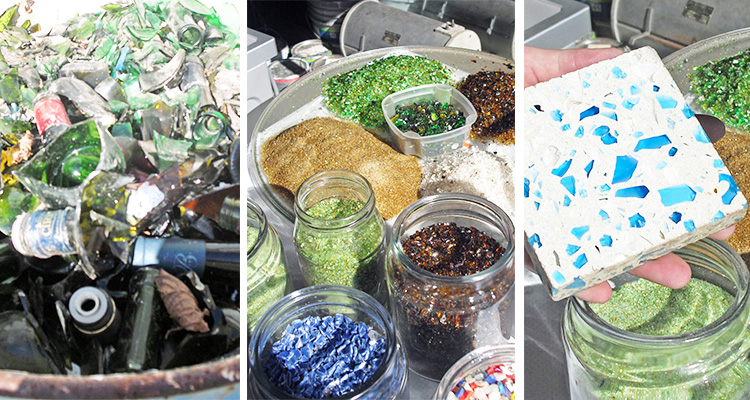Editor’s note: Part of a continuing series on the environment, today’s post checks out how area recycling programs are faring a year after China’s sudden pullback from a role as the global buyer of recyclable commodities threw the industry into near paralysis.
A year ago, local recycling programs were struggling.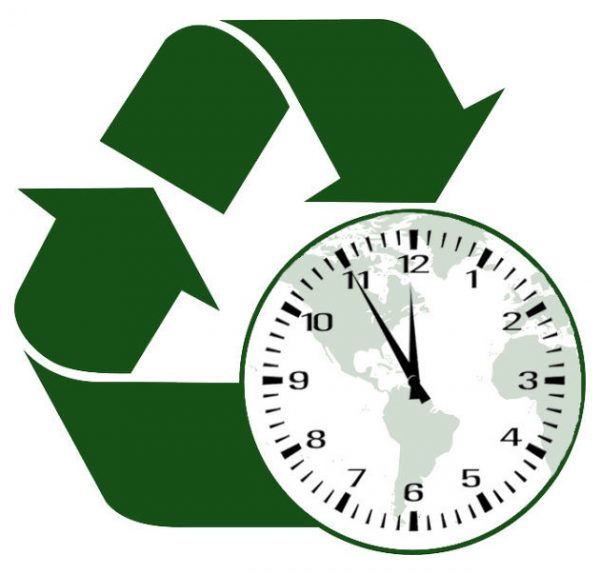 Popular drop-off sites at Oglebay Park and the Clearview community suddenly closed — their mixed collection of plastic, paper and metals nowhere near pure enough to meet new Chinese commodity standards.
Popular drop-off sites at Oglebay Park and the Clearview community suddenly closed — their mixed collection of plastic, paper and metals nowhere near pure enough to meet new Chinese commodity standards.
Inside Wheeling proper, officials were breathing a small sigh of relief, having just found a way to avoid paying to recycle tons of cans, newspaper and so on collected in a longstanding curbside program.
Beyond Ohio County, programs were experimenting wildly in attempts to collect a product pure enough to either make some money or at least break even. Their efforts included everything from a fully staffed drive-through program in New Martinsville to a center that could only be accessed by key-fob-toting recyclers who had paid for the privilege in Cabell County.
The out-of-the-bin thinking seems to be working. For now, at least.
THE BINS ARE COMING BACK
Wheeling has recently doubled its recyclable collections by adding corrugated cardboard to its list of accepted items. And, the county-run bins are coming back.
“We are actually in the process of setting up a drop-off location that is going to be fenced and gated,” announced Tammy Bonar, executive director of Ohio County Solid Waste Authority.
The new location — which will replace the shuttered Oglebay and Clearview sites — is at The Highlands, behind Best Buy, she said. Noting the Ohio County Planning Commission and Economic Development Authority are providing the land and a fence, she said the site is tentatively scheduled to open by late November.
Initially, Bonar will staff the bins two days a week. She hopes to eventually be able to hire a site supervisor and expand the hours as recyclers will only be able to use the site during staffed time.
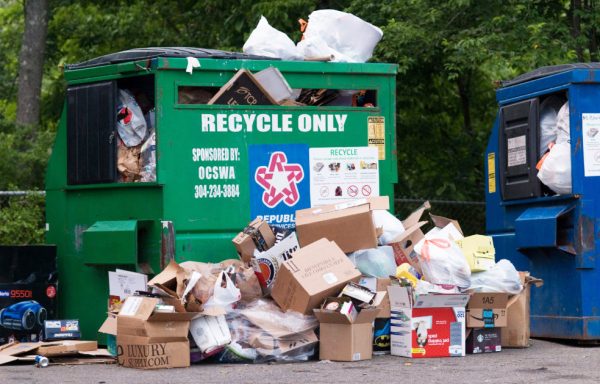
PURELY ACCEPTABLE
Purity of product also remains an issue, Bonar said.
Recyclers will need to remove container labels and lids, rinse containers thoroughly and pre-sort recyclables by type. The site will accept aluminum cans, bi-metal cans and plastics 1 and 2 (mostly milk jugs, water bottles and detergent bottles), and a mix of newspaper, paper and cardboard.
“We’re going back to sorting and making it more evident that we’re looking for a commodity, a good product,” Bonar said of returning to what is called “single-stream” recycling.
At Oglebay in particular, where “mixed-stream” recycling was allowed, the bins had become an overflowing Wild West. People were dropping off everything from non-allowable items such as Styrofoam to non-recyclable items such as toys.
“It really is going back to how it used to be,” she said of reaching a purity level that can bring in enough money on at least some items to subsidize other recyclables that are currently money losers.
Single-stream recycling will also allow the program to stay local, she added. The current plan is for the metal cans to be recycled inside the city by Strauss Industries, the paper products to go to Valley Converting in Toronto, Ohio, and the plastics to go to Waste Management’s Greenstar facility in Pittsburgh.
If any portion of this plan falls through, she said the Brooke County Solid Waste Authority, is also an option. That SWA, which handles recyclables for the city of Wheeling, has its own baler and sells directly onto the commodities market.
“Fingers crossed,” Bonar said of hoping that the market will stabilize and it will all come together locally.
BOXES IN, BOXES OUT
The city’s experiments over the last year suggest it might. Rusty Jebbia, public works director, said the city’s addition of corrugated cardboard to its list of recyclables in mid-summer is going very well.
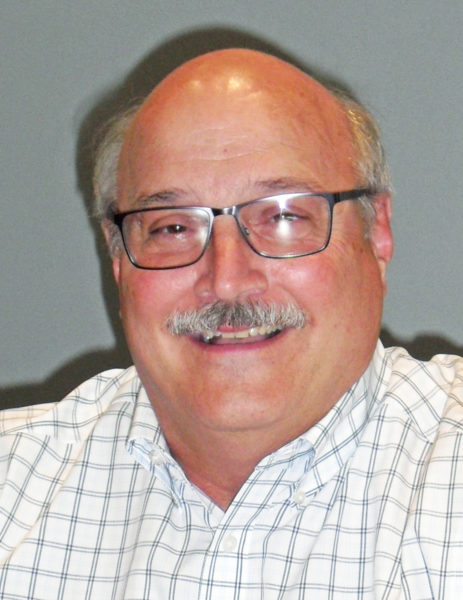
“The cardboard has really boosted what we’ve been picking up from a tonnage standpoint,” Jebbia said of residents being more than happy to flatten the abundance of boxes that has come with increasing online shopping. “It’s more than doubled.”
And that is a lot. In 2017, the most recent year of records available to Weelunk at deadline, Wheeling recycling collected 176 tons of materials that would have otherwise been landfilled.
(A point of comparison, however, Jebbia said the city was collecting nearly 1,000 tons of recyclables a year when the curbside program began in the early 1990s. Then, even newspaper was a slightly for-profit commodity.)
The city has also faced purity issues as the Chinese market contracts, he added of other tweaks to the program.
Recycling workers now have pre-printed brochures that are left inside bins if residents are putting out non-accepted items (such as plastics, which the city has never taken) or items that are not as recyclable as they may appear.
“Cat food cans!” Jebbia said of one particular problem. New cans may look like metal, he said, but they are actually cardboard, ringed with a bit of aluminum.
AND OUTSIDE THE BOX
Scott Ludolph, owner of Scrappy Pappy’s Recycling of Wheeling, is a big proponent of anything that will keep Ohio County’s excess stuff out of landfills or rivers. But, he is skeptical that traditional recycling will hold up long term.
His independent business, which his father and brother opened in 1987 to specialize in scrap metal, has become a money-losing operation with the changes in the commodities market, he said.
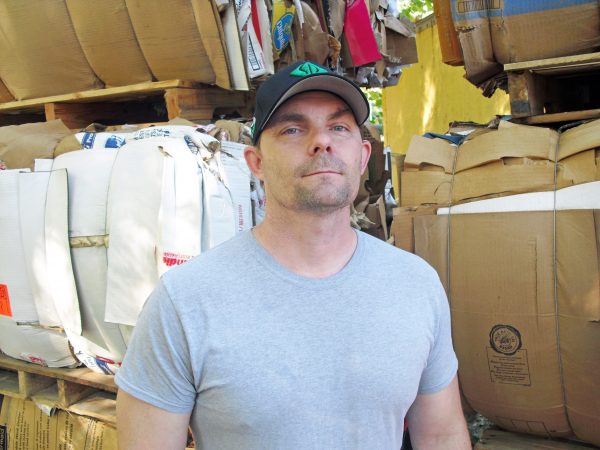
Knowing most of his “customers” by name, he continues to accept paper, cardboard, aluminum cans, tin cans, all kinds of batteries and electronics at no charge. Other items, such as older TVs, can be dropped off for a fee.
“I’ve made a difference,” he said of keeping tonnage out of landfills. “I just haven’t made a lot of money — and it has nothing to do with my passion or work ethic.”
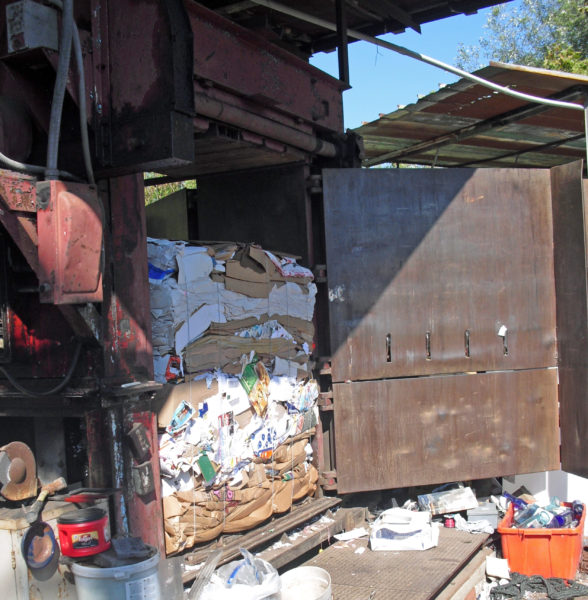
Ludolph, who now operates Scrappy Pappy’s as a side gig in addition to a full-time job, believes shipping recyclables off, particularly to far-flung locations, is no longer workable. The money just isn’t there, he said, particularly for entrepreneurs who aren’t operating with subsidies from residential garbage fees or landfill tipping fees on trucks.
That doesn’t mean he isn’t experimenting with ways to stay both financially viable and meaningful to the community.
In one venture, he recently accepted a large load of walkers, wheelchairs and crutches. Rather than scrap them for the metal, he’s connecting with agencies that can get the equipment to people in need.
He’s also looking at personally manufacturing a decorative concrete product that can be used for countertops and other household purposes. The basic idea is that discarded glass and/or plastic bottle caps is broken and tumbled and is then added as flecks of color to concrete.
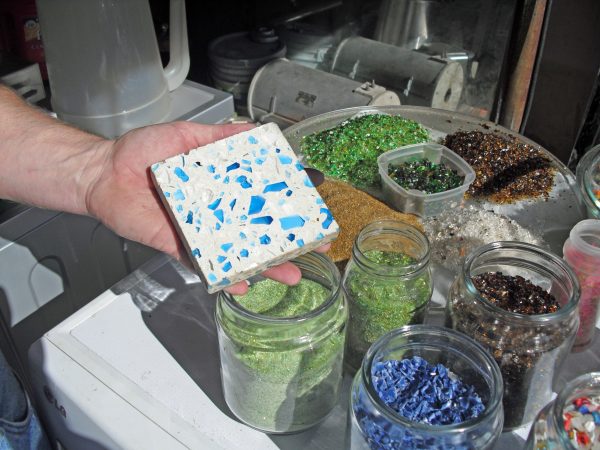
Scrappy Pappy’s already has a machine to do the tumbling and Ludolph is looking into factory space to make the slabs, perhaps in Marshall County. He is also experimenting with Styrofoam re-uses.
“It’s either close up or adapt,” Ludolph said of changing to meet the realities of the recycling marketplace. “I don’t just adapt, I want to thrive … I’m going to make my own hope.”
• A long-time journalist, Nora Edinger also blogs at noraedinger.com and Facebook and writes books. Her Christian chick lit and faith-related non-fiction are available on Amazon. She lives in Wheeling, where she is part of a three-generation, two-species household.


